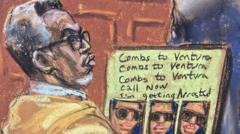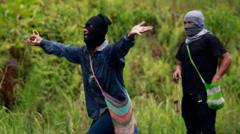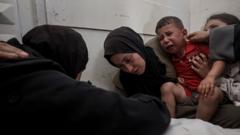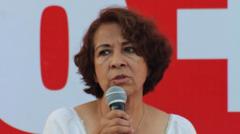President Noboa's re-election reflects strong public support amid significant security challenges in Ecuador, but claims of electoral misconduct by his rival highlight a divided political landscape moving forward.
Ecuador's President Daniel Noboa Secures Re-Election Amid Controversy

Ecuador's President Daniel Noboa Secures Re-Election Amid Controversy
In a decisive victory, President Daniel Noboa won Ecuador's presidential run-off, pledging to continue his crackdown on crime despite allegations of electoral fraud by opponent Luisa González.
Sitting Ecuadorian President Daniel Noboa has successfully secured re-election during the run-off of the country’s presidential election, granting him the opportunity to serve a complete four-year term. Noboa, who took office only in November 2023 after a snap election, celebrated his triumph as "historic." Since his initial ascension, he has prioritized a rigorous military approach against violent criminal gangs, which have led to soaring violence levels throughout Ecuador.
His left-wing rival, Luisa González, contested the legitimacy of the election results, alleging fraud, but failed to present concrete evidence to support her claims. According to data released by Ecuador's National Electoral Council, Noboa achieved a substantial victory, garnering approximately 56% of the vote after polls indicated a closely contested race. “A victory of more than ten points and over 1 million votes, leaving no doubt as to who the winner is,” Noboa stated following the announcement of the results, attributing his success to his team's perseverance and hard work.
The re-election empowers Noboa to maintain his aggressive stance against drug-related crime, which has led to significant changes, such as militarizing urban areas and prisons, and constructing new high-security facilities. Recently, he expressed intentions to seek assistance from foreign military forces, including those from the US and Europe, in battling gang violence. Moreover, he is contemplating constitutional amendments to once again permit foreign military bases, which were banned under former President Rafael Correa, who is also González’s political mentor.
Although homicides have slightly declined during Noboa's presidency, violence remains remarkably high, evidenced by over 780 murders in January alone, marking one of Ecuador's deadliest months in recorded history. With security ranked as the primary concern for voters leading up to the election, Noboa's significant challenge will be demonstrating the efficacy of his anti-crime measures to prevent civil unrest.
In addition to security issues, Noboa is under pressure to address economic concerns, particularly unemployment, which worsened during his tenure due to a severe drought that led to extensive power outages. His plans to enhance Ecuador's energy infrastructure and boost investments in renewable resources have been highlighted as potential solutions.
Noboa’s outreach to younger voters and focus on job creation through modern social media strategies were key components of his campaign, along with commitments to improve infrastructure and combat corruption. Following her loss, González criticized the electoral authorities, accusing them of undermining democracy, and requested a recount, although concrete evidence will be necessary to initiate such an action.
Noboa's victory sharpens the political divide in Ecuador, as many supporters of González nostalgically reminisce about the perceived prosperity during Correa’s presidency (2007-2017). This division poses another obstacle for Noboa, as he must work diligently to unify a country grappling with burgeoning discord and uncertainty.





















